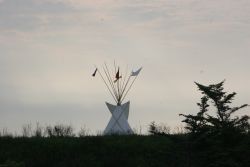Halifax Media Co-op
News from Nova Scotia's Grassroots
Pjilasi Mi'kma'ki - Episode 3: Wrestling with the Reserve System
In this third episode of Pjilasi Mi’kma’ki, we will be exploring the reserve system in Canada. In 2011, over 360,000 First Nations people lived on reserves in Canada. Statistically, they were less likely to have access to clean drinking water, were more likely to suffer from alcohol and drug-related issues, and suffered from elevated rates of suicide. A lack of employment opportunities, sub-standard housing and predatory child apprehension policies make reserves a tough place to thrive in.
But statistics only paint by number.
Reserves are also a place where language and culture have, to a degree, been safeguarded. They are places where everybody knows everybody; that’s how family is. Even though there are negatives and positives, the whole community is a family and they’ll still watch over people.
Increasingly though, First Nations folks are gravitating towards urban centres. The urban Aboriginal experience isn’t always an easy one either, with the temptations of addictions and a fast money lifestyle clashing up against a systemically racist system. Even in the city, you see non-Indigenous people looking at Native people like dirt.
Folks like Patti Doyle-Bedwell, of Paqtnkek First Nation, Nova Scotia, work hard to create safe and healthy education opportunities for Indigenous people to succeed. Education can be one of the tools to survive and thrive and ultimately elevate the community’s standing.
“I think sometimes the reservation is like a double-edged sword,” says Doyle-Bedwell, of Dalhousie University’s Transition Year Program. “We’re all together. We’re with our family. Our language is spoken. It’s a way to keep ourselves connected to our family and our culture. But then when you think about the history of it, it was created to keep us separate. To turn us into good White People. To get us away from hunting and fishing. It was like a prison.”
There’s lots to talk about in this episode, from the inception of the reserve system, to daily struggles with addictions and lack of opportunities – both on and off the reserve. I hope you do listen and share with family and friends.
Click HERE to listen to the third episode of this unique Mi’kmaq/English podcast. And be sure to visit the Pjilasi Mi'kma'ki website, where you can listen to the three episodes currently available.
Wela’lin, Annie Clair
The site for the Halifax local of The Media Co-op has been archived and will no longer be updated. Please visit the main Media Co-op website to learn more about the organization.



